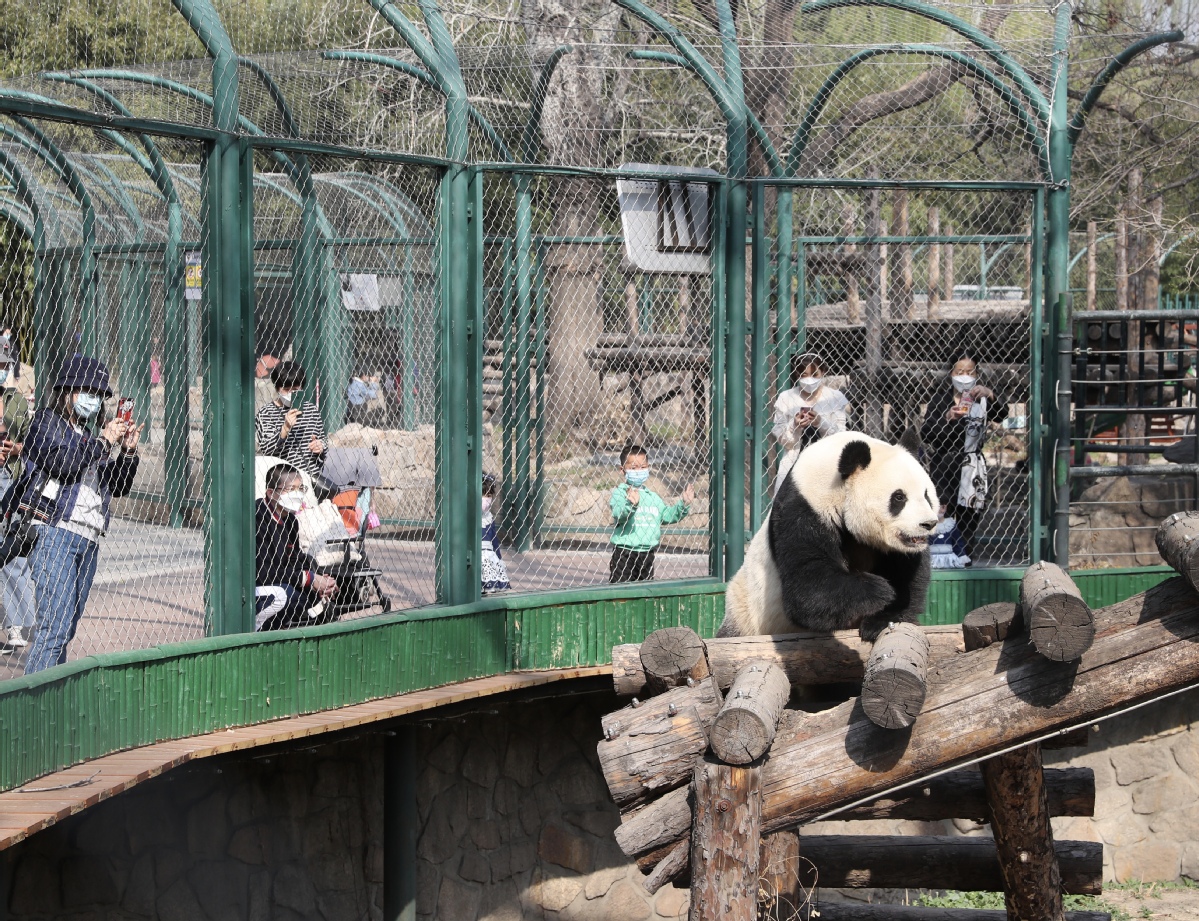Beijing zoo reopens after 59 days
By Xin Wen in Beijing and Huang Zhiling in Chengdu | China Daily | Updated: 2020-03-23 17:29

Regular checks carried out on animals
Beijing Zoo reopened on Monday after being closed since Jan 24 as part of efforts to control the novel coronavirus pneumonia outbreak.
The 5,000 animals have been fed well, are housed in sanitized areas and are enjoying the spring sunshine.
Zhang Chenglin, the zoo's deputy director, said, "Some of the animals, such as the pandas, preferred to have more exercise when the zoo was empty."
Veterinarians checked the animals' health. A pregnant Malayan tapir received the most attention, with regular ultrasound examinations.
Ma Tao, who looks after pandas at the zoo, starts his working day at 7 am by taking a fixed route on a delivery truck to feed the animals in their enclosure.
Workers such as Ma help prepare 2,000 kilograms of food for animals at the zoo every day, including chopped carrots, fresh cucumbers and raw meat.
"My happiest time of the day is to see the animals eating, even if sometimes they take a bite out of my arm," Ma, who is in his 40s, said jokingly. He added that it usually takes about three hours to distribute food to all the animals.
Occasionally, they need "afternoon tea", with grapes being the red pandas' favorite. Ma often feeds these animals by hand.
With snow falling in Beijing in the middle of last month, keepers spent more time checking on the animals. Some of the inhabitants preferred to keep warm in their enclosures, while others enjoyed being outdoors.
Zhang said: "Tufted deer prefer to be outside and can resist the cold even in extreme wintry conditions. They jump and run around frequently in the snow."
In the past month, zookeepers have been engaging with these animals to win their trust.
Zhang said he is most concerned about baby tufted deer, as they are extremely timid. He added that the term of a pregnant tufted deer is between three and seven months, during which time the animals must be provided with a quiet and stable environment to ensure they have adequate rest.
In the wild, tufted deer, which are listed as a national first-class protected wild animal, usually inhabit forests at an altitude of about 1,000 meters.
"Keepers need to be patient so that these creatures can get to know them after the first contact," Zhang said. "In the case of a newborn tufted deer, a keeper has to come to the animal at least four times before it will trust him and eat from his hand."
Zhang said disinfection measures at the zoo have been strengthened.
"We completely disinfect and sterilize the zoo once a week," he said, adding that the animals' food is carefully checked and purchased from Xinfadi, a wholesale market for agricultural products about 20 kilometers south of the zoo.
"We have sufficient food stored at the zoo to feed the animals for six months," he said, adding that designated suppliers have to be contacted in advance for deliveries of some food, such as bamboo for the pandas.
Zhang said online trips to the zoo are available, where visitors can see enclosures being disinfected and the animals fed.
Beijing resident Wang Shengru and her 6-year-old daughter are eagerly waiting to revisit the zoo. The chimpanzees are the young girl's favorite, as the animals make her laugh when they eat bananas.
Due to the outbreak, both mother and daughter have remained at home for more than one month. "She misses her animal friends terribly," Wang said.
Since Feb 22, Hongshan Forest Zoo in Nanjing, Jiangsu province, has been livestreaming footage of animals being fed. In the mornings during weekends, two "hosts" use a phone camera to take online visitors on a sightseeing tour of the zoological park.
Many people have voiced concern about food supplies for animals at the zoo, with online donation campaigns being launched to provide them with fresh vegetables, fruit and meat. The livestreaming sessions show that the animals are being fed well.
























